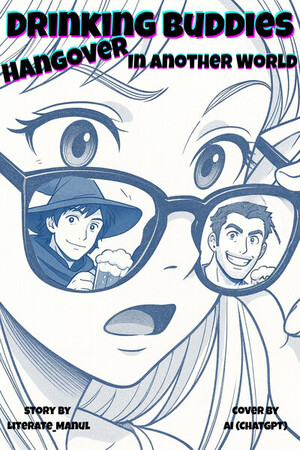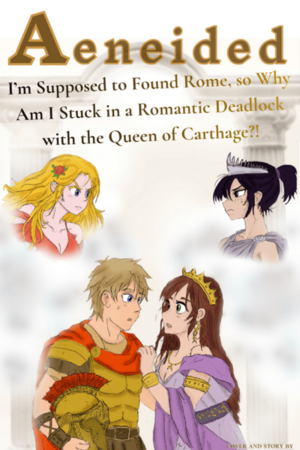Chapter 11:
What is a Carrack?
It Hit Me Like a Truck
The gallery was a bit of a disappointment, to be honest - and that’s coming from someone who spent their childhood in England. Una’s restlessness and desire to get the exhibition over with as soon as possible made her more akin to a persistent mosquito than an art critic. The worst thing is that they pulled me out of the wonderful flow state that gazing upon the antique paintings provides, and instead sent me back into my own head. Thinking about the day’s events.
“Are you done with this room?” Una tapped her feet as she glanced at her phone every now and then.
“Fine,” I said. “We can finish with the whole gallery. We can waste those tickets that I wanted so much, and we can sit at the gallery restaurant. A restaurant that probably has overpriced food that’s been thrown in a microwave. Are you happy?”
She smiled, tucking her phone away into a pocket. “Yeah! Let’s go!”
I sometimes didn’t know if she was trying to annoy me, or if she was genuinely so obtuse that she didn’t detect the sarcasm in my voice. I exhaled sharply through my nose, and then began walking towards the entrance hall of the gallery. Unfortunately, the so-called “restaurant” was just a glorified room full of benches and vending machines. I paid far too much for an anaemic looking dinner, and then sat down with Una opposite me, her face still carrying the joy of being freed from the gallery floor.
“Why do you look so upset,” Una asked, snapping her chopsticks. “Don’t like your food?”
My hand trembled a little as I looked down at my meal. I didn’t dare to look up at Una, but I knew she wouldn’t even make eye contact with me if I did. What the hell was this even meant to be? We were only here for twenty minutes at most, and that included the queue to enter! I knew she didn’t care about what I was interested in, but I thought it was basic manners to at least pretend.
“Maybe,” I said, catching my breath with every word. But as I continued, I awkwardly fumbled, and made an embarrassing noise. I caught my breath again, and looked up at her with embarrassed eyes. But as I expected, she was looking down at her food instead of at me.
“Maybe it’s because you rushed me through an exhibit that I wanted to visit really badly. And now we have nothing to do.”
She sat there in silence for a few seconds, and I looked down at my own food. I didn’t want to bring attention back to the fact she was ignoring me.
“So you really wanted to come here, is that it? You really like art galleries and you wanted to see it in your own time with your dad?”
I clenched the fist of my left hand, rubbing my thumb along my finger. I wanted to scream, ‘Of course! Of course! How thick are you?’ But I was too afraid to express anything more than mild disappointment.
“Yes. Or, just, someone who’s a bit quiet, I guess. I just wanted to see this all. I waited for this exhibition for so long,” I said, my breathing getting deeper and my voice spluttering every other word.
“Oh,” Una said, picking up some meat in her chopsticks and looking at it for a second before putting it in her mouth and chewing it. “So they only have this exhibit once and then they never show it again? I can see why that makes you sad.” Her tone of voice absolutely betrayed whatever she was supposed to be saying. It didn’t have a drip of sympathy… although it didn’t seem mocking, either. She spoke about it matter-of-factly, as if we were discussing the weather. I could have sworn her eyes met mine for a split second as she went in for the next bite. I sat there clenching my teeth. It was so obvious to me how she just didn’t care, but I couldn’t exactly have a go at someone because their tone of voice wasn’t sympathetic enough.
“Well, no. But my dad was coming. I wanted to see it with him,” I admitted.
“So that’s it. It wouldn’t matter how long we spent there in the gallery. Also, stop talking so much - our food is getting cold.”
Una had got through her food fairly quickly, although that was probably largely down to how much time I spent talking. More accurately, it was probably because of how long I spent thinking about what to say. While I pondered deeply about how to respond, it seemed like Una blurted out the first thing that came into her head. It was usually wrong. She was clearly more interested in her food and her phone than me, and I suppose I could hardly be upset about that.
“I’m not working tomorrow, by the way,” Una added, checking her phone.
“You work every day, though,” I said. I was confused. It was like the Shimizu couple told me - she had to work there because she was staying with them. Then again, Hideki Shimizu didn’t work in the cafe, so I doubt they were exactly sticklers for the rules.
“Hmm, that’s true,” she said. “But so is the fact I don’t go to art galleries. I guess I’m breaking a lot of rules this week.”
Una had this strange way with words where you sort of knew not to add anything that wasn’t necessary. That response - at least in my mind - was sufficient. I finished the rest of my meal in silence, and stood up. Una had already put her stuff away, so I was left to quietly do the same. With nothing left to do, I threw away the stubs of the tickets and walked out the gallery with her.
“To the station?”
Una nodded.
At the station, I turned to Una for a second. “Wait, do you live in the cafe or something?”
She raised an eyebrow. “No.”
“Makes sense,” I said. “You’re not a spatula or something. Where should I drop you off then?”
“Well, I live near the cafe. Just follow me when I get to the station.”
I nodded, and reached into the bag my dad gave me. Professor Thomas Raymond-Heard, Understanding the Carrack. It was a paperback, which would look out of place on my shelf with his other books. Still, my dad got it early, so I suppose I should have been grateful. I opened it up, and began a cursory read before our train came to its destination, and I placed it back in the bag. As we walked out of the station, Una took the lead.
“Yorito,” she asked, with slight teasing in her voice. “What’s a carrack? What were you reading?”
“It’s nothing important,” I lied. It was easier than explaining that I paint and model 500-year-old boats for fun.
“Got to be pretty important if you’re reading a book about it,” she responded. I didn’t say anything back, instead letting the hum of the city and the clack of her footsteps fill the air. Her shoes were impeccably clean, I noticed, and the lights from the city reflected off them in a beautiful gleam.
“Alright, I live here,” she said. “I’ll see you tomorrow.”
I gave her a little wave, although she didn’t wave back. Her face was fixed to the door, as she unlocked the door to her apartment building and wrestled it open. It wasn’t very dark yet, considering how my dad left fairly early into the afternoon and how Una zoomed through the exhibition, but I still felt like heading straight home. I read more of the book on the train, and was getting slightly concerned with how quickly I was getting through something I’d anticipated for years. I put it away early so that I could savour it a little, and then followed the familiar winding road home, eventually reaching my house.
I slid the door open.
Usually my mum was able to sense when I was coming home no matter what time I did, but today her voice seemed like it was slightly caught by surprise.
“How was your time with dad?” Her voice had a real sense of curiosity in it.
“It wasn’t,” I grumbled. “Not really, anyway.”
“Do you want some tea?”
“No,” I replied, having taken my shoes off and made my way into my room in the brief time she attempted to initiate conversation. I exhaled deeply.
Then I slid my door shut.




Please sign in to leave a comment.